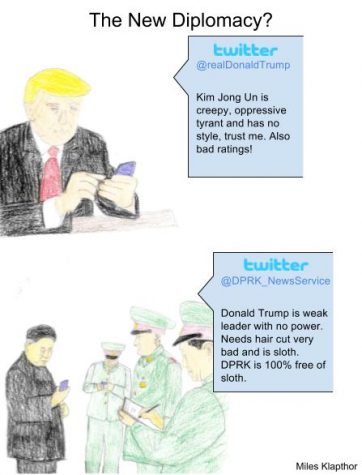Is Twitter part of the new diplomacy?

According to Statista, a statistics recording website, 2.46 billion people worldwide now use social media, including 208.91 million Americans—about 78% of the country. And according to a study by Informate Mobile Intelligence, Americans spend as much as 4.7 hours using social media or smartphones per day. Considering that the average American is awake for 15 to 16 hours per day, up to ⅓ of your day could be wasted on your phone.
Naturally, with people spending so much time using social media, how could one not expect people to capitalize on other’s suffering? Enter advertising. Then clickbait, and finally, fake news. Now the internet is even worse. But still, more and more people seem to be creating accounts for social media platforms. I can only imagine why.
But regardless, millions of people do in fact spend lots of time using social media. Therefore it makes sense that governments would capitalize on the trend, using social media to communicate with citizens in instant time. Although it provides a convenient way to share information, it also creates an expectation for instant information.
That’s no problem if farmers want to read about new township zoning ordinances, or downtown businesses want to know about road construction schedules, but what if a politically and economically isolated nation-ruled with an iron fist by a man probably aspiring for the domination of other countries-threatens to attack the United States or its allies with a nuclear weapon? People will expect a strong leader to respond swiftly and appropriately to reassure them of their safety, and minimize the possibility that the threat will be carried out.
But can a strong leader do all those things in under 160 characters and in a matter of hours or even minutes?
That’s a good question, considering that this is a new phenomenon. Not North Korea’s leader making nonsensical threats and scaring other nations, prompting the United Nations to respond with more sanctions to appear as if they have any influence over a crazy dictator (seriously, what can you still trade with North Korea at this point?) which has pretty much been an issue ever since the Kim family, or dynasty if you prefer, has been in control. No, social media is the only new aspect to an ever-increasing diplomatic challenge that doesn’t seem to be getting any easier.
The biggest issue with the introduction of social media to international diplomacy is, well, the inherent nature of social media. Instant access to unfiltered information. It’s more important to say something, anything, than something correct. In other words, something the federal government would try and avoid.
However, in the case of U.S.-North Korea relations, President Trump is expected by users (and himself, evidently) to quickly reply to tweets from Supreme Leader Kim Jong Un that show little coherence or understanding of policy with tweets that also show little coherence or understanding of policy, but that are at least insulting, threatening, and proclaiming superiority over the other.
And so, my question is, where does it end? Do we have to wait for countries to go to war over tweets, or will administration officials from both countries realize that Twitter and other forms of social media have no place in international diplomacy?
My guess is since Supreme Leader Kim Jong Un controls the information that North Korean citizens receive about the outside world, they will think that his usage of social media is acceptable within the (artificial) context that is provided. And President Trump has not been known to shy away from a Twitter argument either. Maybe we should let Secretary of State Rex Tillerson do the tweeting from now on.








